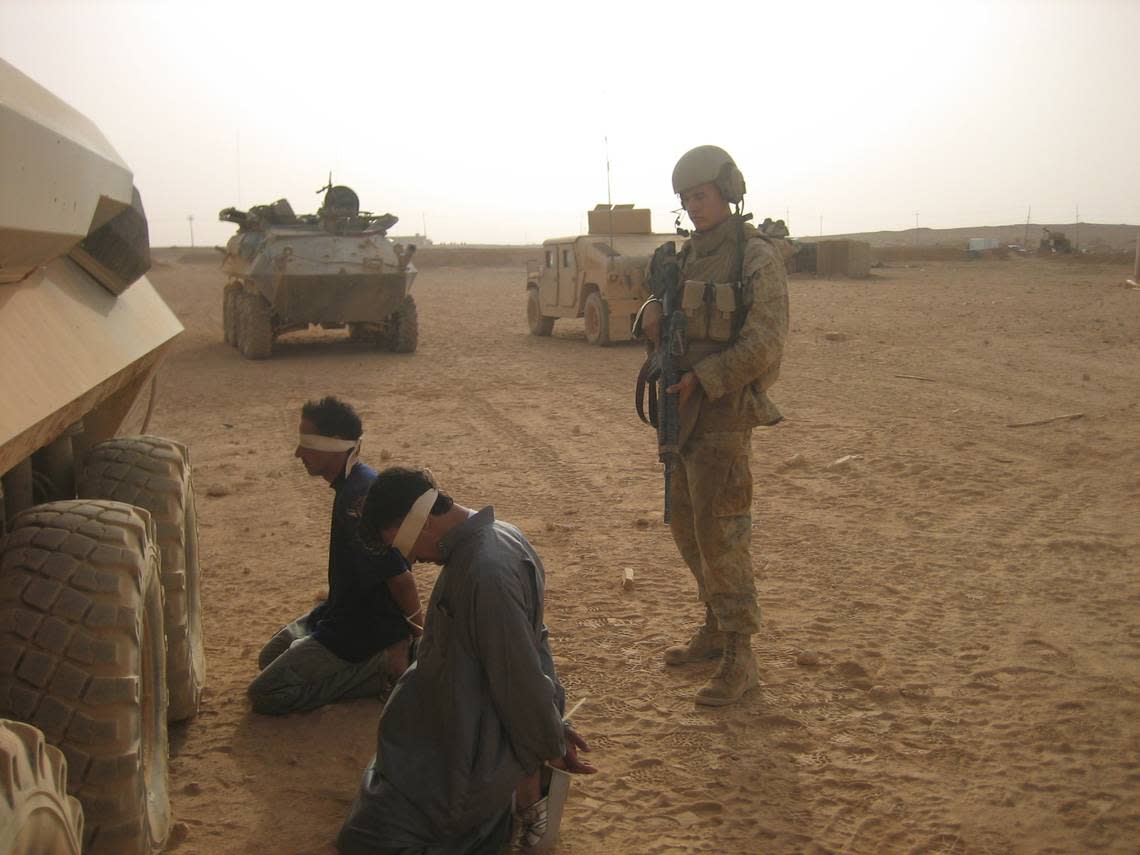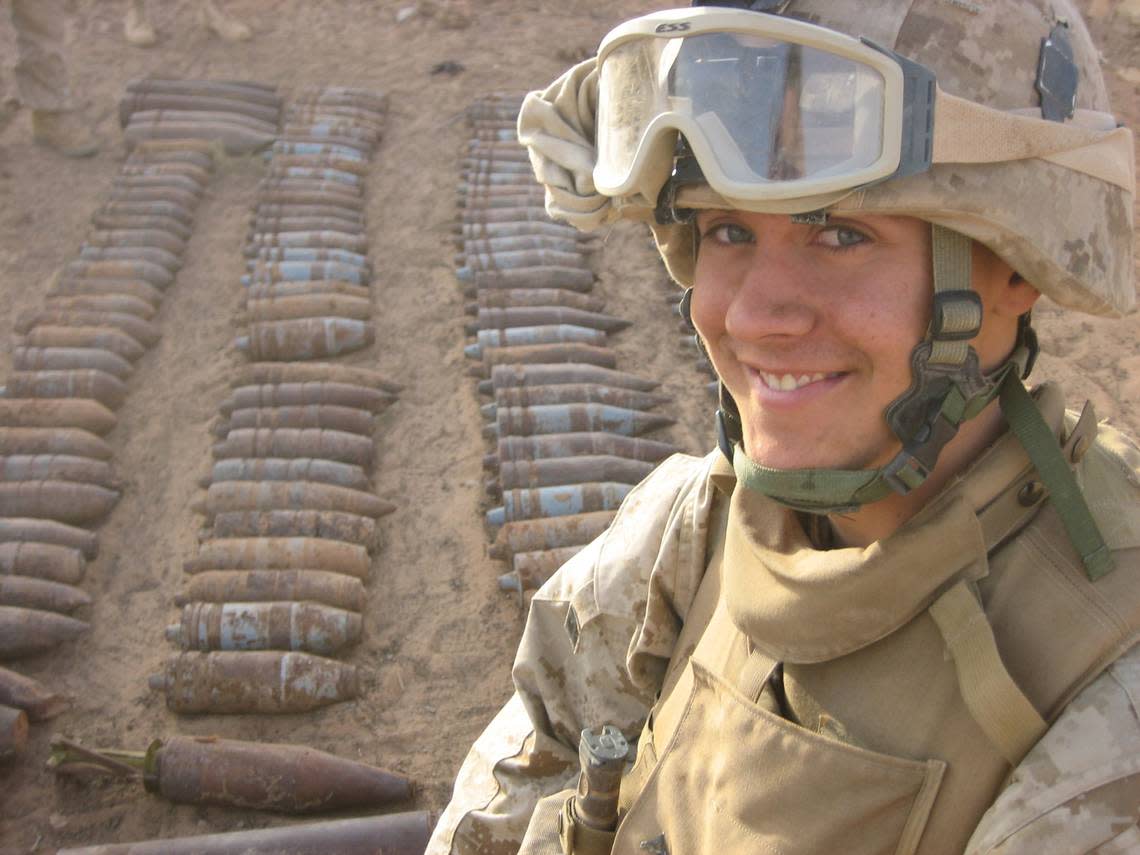Stabbings, shots fired, a biker gang, mental illness: Lessons from Fresno-area vets | Opinion
On Oct. 26, Manuel Bracker allegedly entered Lithia Ford on Bullard Avenue in Fresno and, for no apparent reason, walked into a meeting room and stabbed one of the dealership’s employees.
Bracker, 36, was caught by police a short distance away, and now faces charges of attempted murder with enhancements of causing great bodily injury and using a knife as a deadly weapon.
It was not Bracker’s first such incident. In 2019, he stabbed a 63-year-old woman in a Fresno grocery store. He told police she was a cannibal.
Bracker is a veteran of the U.S. military. Another member of the armed services who ran afoul of the law is Nick Ramey. Formerly of Madera Ranchos and now of Fresno, he was arrested in 2015 for illegally shooting off a gun after becoming drunk, then getting into a dispute with some employees at a Clovis bar.
Besides being veterans, both men also have had significant mental health challenges. Each entered the court system, and were placed into diversion programs.
Opinion
Their stories show the peril, and potential, of programs intended to return offenders to mental health, restore their productive lives and keep California’s prisons from getting overcrowded. Their tales also force a re-examination of the values of punishment vs. rehabilitation, and just what Californians want to support more.
Troubled man
What can be gleaned about Bracker must come from court records of previous cases. It is the policy of those in Fresno’s legal system not to discuss current cases until they are concluded. Bracker’s next court date is in January.
After being arrested for the 2019 stabbing at a Grocery Outlet, Bracker agreed to plead no contest to a charge of assault with a deadly weapon and was sent to Behavioral Health Court. District Attorney Lisa Smittcamp said he failed the program requirements, and was eventually sentenced to two years at Wasco State Prison, which she said is a normal sentence for an assault case.
Once he served his time at Wasco, Bracker got into trouble anew. He allegedly attacked a man with a knife on Nov. 26, 2021, then was arrested a few weeks later for allegedly vandalizing and committing burglary at a credit union.
So why was he walking freely among the public this past October and thus able to allegedly attack the Lithia Ford employee? I put that question to Smittcamp.
She points to a bill passed by the Legislature and signed into law by then-Gov. Jerry Brown in 2018.
Assembly Bill 1810 is a broad measure covering a range of health issues. Among its provisions, the bill created a diversion program for accused offenders who have mental-health disorders. Defendants who could show their crimes stemmed from mental illness could, with a judge’s permission, enter a diversion program for up to two years. Mental-health specialists would work with the defendant, with the goal to return that person to full health. If that was accomplished, the offender’s case would be dismissed and the arrest erased from the record.
Smittcamp said whatever therapies were ordered for Bracker apparently did not work, and he likely did not fully utilize the programs offered to him. A warrant for his arrest was issued on Oct. 14 after he failed to appear at a suitability hearing. The Lithia Ford incident happened soon thereafter.
She said the prosecutor, defense attorney and judge in Bracker’s case met their responsibilities. But there is little to no oversight of defendants out free on mental-health diversion, she said. The law itself is the problem, Smittcamp emphasized.
“This is a system failure,” she said. “In the wake of system failure, you have all these victims. The victim in this latest case is very lucky to be alive. The law needs to be changed to ensure accountability and responsibility for criminal behavior.”
Finding himself again
Another person lucky to be alive is Ramey. Not that long ago the battle-hardened Marine was deep in depression and ready to commit suicide.
“I got blown up a bunch of times” is how Ramey, a former lance corporal, describes his time in Iraq over nearly four years as a member of the Marine First Division, Third Light Armored Reconnaissance Battalion, Apache Company.

With all the combat he experienced, Ramey developed hearing loss and could not hear the orders when his commander yelled to fire.
There were other complications that would affect his service. His brother, Marine Lance Cpl. Branden Paul Ramey, had been killed in Iraq in 2004. His mother, distraught that her other son would die in war, as well, attempted suicide.
While Nick was back in California awaiting a new deployment, his unit commander found out how Branden had died in combat, and how his mother was beyond distraught. So Nick was classified as a “sole survivor,” and the Marines moved quickly to give him an honorable discharge. What normally would take six months got done in a matter of three weeks.

He came back to his parents’ rental home in the Madera Ranchos, unemployed and suddenly without purpose. Ramey said he started drinking, and soon the marriage to his high school sweetheart fell apart.
One day, they got into a dispute, and he pushed her out of the house. The scuffle left a mark. She was unhurt and did not press charges, but Ramey was arrested for domestic violence.
It was during a trip to court that he met a group of veterans who rode motorcycles. A rider himself, he joined in and found a camaraderie that had been missing. He joined up and took on a new name: Spike. And he became a biker gang member.
That led to a phase of his life involving lots of drinking and not much else. A psychiatrist at Fresno’s Veterans Administration hospital helped him see there was more to life than “doing stupid things with bikers.”
“It got hard to justify watching people drink themselves into a stupor every day,” he said.
Within a decade, he went from new member to chapter leader to quitting the gang. Still, the drinking continued.
In 2015, Ramey celebrated St. Patrick’s Day at a Clovis bar. When it was time to go, he left with a friend. Ramey exchanged words with some people in a car blocking the parking lot exit. To show them he meant business, Ramey flashed a .38 handgun in his waistband. Then he fired off some shots into the air as the car he was in sped away.
Soon police were at his door and arrested him for illegally discharging a weapon and brandishing a gun.
“It sank in the next day — I am out of my mind. I cannot do this anymore. I was looking at 22 years in prison.”
His defense lawyer had a plan. Plead no contest to the crime, and then they would seek diversion into veterans treatment court. The lawyer prodded Smittcamp to read the military medical reports about Ramey’s PTSD, developed over the years of fighting.
“Lisa Smittcamp pulled me aside outside of the courtroom. She said, ‘If I give you an opportunity to straighten your future out, don’t mess it up.’”
So Ramey entered the treatment program. It featured regular meetings with Smittcamp, his defense attorney, a representative of the VA and probation. Overseeing it all was Superior Court Judge Hilary Chittick.
Ramey had to go to counseling appointments. He had to make Zoom sessions online. He had to make court hearings. One slip-up, and Chittick could end the treatment and send him to the seven-year sentence he agreed to.
At the end of 18 months, Ramey had met all the requirements and was done with veterans court. The brandishing and discharging charges went away.
“I am proud of who I am now,” Ramey says. “That is because of the VTC court. They put me into programs for my specific trauma and needs.”
Today Ramey volunteers as a mentor with the veterans court, trying to help fellow vets get their lives back on a right path.
Defining success
Chittick, now retired, believes diversion programs make a major difference. “In the time I was doing diversion courts, the vast majority of the people we diverted were successful.”
But, I ask her, what about the one out of 100 who returns to committing crimes, like Bracker? Is that too high a risk for the public?
She offers an analogy: If 99 of 100 cancer patients were cleared of their disease, that would be considered a smashing success.
“All of these systems, whether punishment- or treatment-oriented, are unsuccessful with some individuals,” she said. “None are 100% successful.”
What has to change is the mindset of the mental health and addiction fields, Chittick said. Currently, they oppose involuntary commitments of defendants into programs meant to help them. The belief is that the defendants themselves must agree to treatment for it to work.
With AB 1810, “we changed the criminal justice system and moved them (defendants) to the mental health and addiction systems. But we never really changed mental health and addiction, and it is utterly dysfunctional. It cannot cope with the people coming into it, philosophically and otherwise. It is impossible.”
That assessment, of a veteran judge with lots of experience with troubled defendants, is sobering.
Nick Ramey shows the promise of diversion programs. But Manuel Bracker shows the dangers of failures, for whatever reason, of such programming.
Another look
So what should happen?
Certainly state officials should undertake a review of how well AB 1810 is working, especially when veterans are involved. Testimony from district attorneys like Smittcamp would be valuable, as would views of the defense side and judges like Chittick.
One of Fresno’s Assemblymembers, Joaquin Arambula, is a physician with keen interest in health issues. He could seek an investigation into what is working vs. what is not, and offer legislative improvements to AB 1810. It would be great if Republican Assemblymembers Jim Patterson of Fresno and Devon Mathis of Visalia joined in to help push a review.
Absent any effort like that, more people like the Lithia Ford employee are bound to become victims. And vets like Manuel Bracker remain victims of their mental illness. Neither outcome serves California well.
